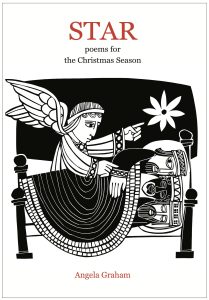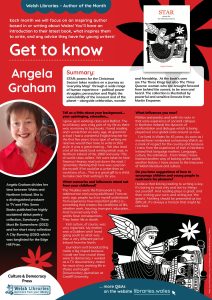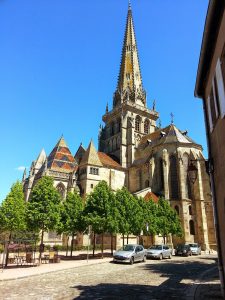Angela Graham
December 2, 2024
Angela Graham is from Northern Ireland. She became a full-time writer in 2017, following a long career as a film maker in documentary and drama (BAFTA Cymru Awards, Oscar Foreign-language entrant). A Writer’s Bursary from Literature Wales helped Angela complete her collection of 26 short stories set in Wales, Northern Ireland and Italy, and A City Burning was published by Seren Books in 2020. It was longlisted for the Edge Hill Short Story Prize 2021. Her 2022 collection of poetry, Sanctuary: There Must Be Somewhere, was also published by Seren Books.
Angela is Welsh-speaking, and divides her time between Northern Ireland and Wales. She has received an Honorary Life Fellowship from the Institute of Welsh Affairs for her work on media and democracy. Her second poetry collection STAR: Poetry for the Christmas Season was published in August this year by Welsh independent, Culture & Democracy Press.
The collection takes readers on a journey as ‘everyday Magi’ through a wide range of human experience – political power struggles; persecution and flight; the vulnerability of the innocent and of the planet – alongside celebration, wonder and friendship. At the book’s core are The Three Kings but also The Three Queens: women who are brought forward from behind the scenes, to be seen and heard. The collection is illustrated by powerful and sensitive linocuts from Martin Erspamer.
Thank you Angela for answering a few questions for Libraries Wales. Tell us a little about your background…
I grew up in working-class east Belfast. The local library was a big part of my life as there was no money to buy books. I loved reading and I wrote from an early age. At grammar school I had a wonderful English teacher for the first five years. Every type of writing we read we would then have to write in that style. It was a great training. We produced writing every week. The school also put a great stress on Shakespeare and every year we read a play and staged scenes from it in a school competition. We learned so much about theatre.
We also read a lot of the latest local writing which was, in Northern Ireland of the 1960 and early ‘70s, of world-class calibre. We were taken to hear Seamus Heaney read just down the road. I remember thinking that here was a person like myself. If he could be a writer then so could any of us. And when we had exams in school I know now that the unseen poetry we were given to critique was absolutely hot off the press. I sensed it related to my life without knowing this at the time. This is a great gift to a child, to make clear that writing is for you.
What memories and influences stand out from your childhood?
The Troubles were the framework to my adolescence and young adulthood. From an early age, people such as myself understood from experience how important politics is – something that creates the conditions of life, whether work, housing, transport, education… And I learned early that words have consequences. They foster life or death.
Irish culture, of course, was very important. My mother was a Dubliner and I loved going south to what was then a very different part of Ireland from the North.
Journalism and broadcasting made a big impact because I could see how crucial these were to democracy. I worked as a TV documentary-maker for most of my working life in Wales and taught Documentary Journalism at Cardiff University.
As a young person, who or what influenced you?
I was an avid fan of Star Trek, particularly of Mr Spock. I even wrote a novel about the crew of the Enterprise coming to Belfast. I’d read extracts of it to my pals in school every day. It ended when I got the characters into a situation I couldn’t resolve. Early example of plot problems!
We had a wonderful set of English text books called English Through Experience. They introduced us to pieces from writers I now realise were cutting-edge: Rachel Carson’s ‘Silent Spring’ and the science fiction of Ray Bradbury. And all the time we were writing.
I loved art, though I couldn’t draw. We had a great Art teacher who got us to study history of art and of architecture. I loved that and it has remained a passion.
What influences you now?
Politics and poetry, and (with its roots in that early experience of societal collapse in Northern Ireland) the dynamic of confrontation and dialogue which is being played out on a global scale around us now.
I’ve lived in Wales for 43 years. As soon as I moved here I embarked on learning Welsh, as a mark of respect for the country and because I knew from the experience of Irish in Northern Ireland that language matters. Language, culture, the individual… From Wales I have learned another way of looking at the world, another history. I have access to the treasures of Welsh literature and culture.
When did you realise you wanted to write, was there an ‘eureka moment’, and did any particular factors make a difference?
I wrote my first poetry when I was six. It was a natural thing to do. And I wanted to be a writer. I read some books many times because I wanted to understand how the writers achieved their effects. I didn’t find out much because that was beyond me but I never had any doubt that writing was the thing to do.
I have read that some women of my generation in Northern Ireland were made to feel that poetry-writing in particular was not something open to them but, because of the hands-on attitude of my school, it never occurred to me that there was a barrier.
And, again, the public libraries were essential. I was about twelve when I first bought a book in a shop and I remember the experience vividly. An aunt visiting from America had given me enough to buy a paperback novel. A book of my own. Wonderful. But in the library there were floors of books! Without libraries I would not have had access to books other than those we had in school. I would have been starved.
Tell us a little about STAR: Poems for the Christmas Season, what inspired you to write this book, and what do you hope readers will get out of it?
I’m working on a book about the house in which I grew up, a tiny 2-up, 2-down. Christmas was no less special because the house was small. I wrote a poem about my father making Christmas something to remember for me and my mother with very few materials. That got me thinking about how Christmas is experienced in families.
And also, I love sculpture and I came across a photo of a twelfth-century carving from Autun Cathedral called ‘The Awakening of the Magi’. The sculptor had asked himself, What happened before the Three Kings from the Christmas story saw the guiding star. He carved a scene in stone on the capital of a pillar. It shows the moment an angel pokes one of the three sleeping kings and, with his other hand, point up to a star. This is the moment before the great moment; the moment before something is perceived and chosen. That fascinates me. So, maybe the book is an opportunity for the reader to become, as one of the poems puts it, an ‘ one of the everyday magi’ criss-crossing the city, on a journey of discovery, a search for a star.
That’s why the cover of Star is a linocut version of that carving by the wonderful Martin Erspamer. Fifteen of his linocuts accompany the poems.
Once I started speculating on the Three Kings I wondered who they left behind when they went on their journey, and so I ‘saw’ the Three Queens. Who were these women? I wrote them.
The poems in the book attempt to represent, but go beyond, the outer surface of Christmas, into the darkness that is always around it, to realistically consider what grounds we have for hoping for light.
What are your favourite reading genres, and what book are you reading at the moment?
I love Victorian novels, heavy with plot and wildly inventive. And I read a great deal of contemporary poetry.
Do you have suggestions of how to encourage children and young people to read more for pleasure?
I believe that linking reading to writing is key. It’s boring to read only and not try things out yourself. And reading plays is great, and then writing your own, and acting out ‘the greats’. Nothing should be presented as too difficult. It’s always a horizon that might be reached.
Do you have a quote that inspires you?
Seamus Heany’s words from 1975, ‘Whatever you say, say nothing.’ That poem captures the reality of life in Northern Ireland at that time and his observations apply to any society where there is great tension because a lie is being maintained in order to keep some group dominant. Once this negative dynamic is named and outed it becomes less effective. I keep in mind this positive face of such a negative line. Whatever I say, I try to say something worth hearing.
Thank you Angela.
STAR: Poems for the Christmas Season was published by Welsh independent, Culture & Democracy Press, 22nd August, 2024.
More information about Angela’s work on her website.
Read our Get to Know the Author flyer and take a look at our previous Authors of the Month writing in English.



